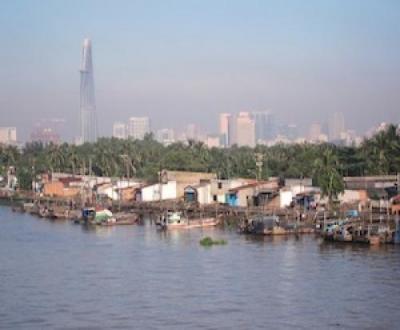Faculty Research Clusters
The Department of Anthropology faculty carry out research with many questions in mind. The categories below suggest many of their current research interests and expertise.
Cultural and Linguistic Preservation: Museums and Digital Archives

Members of the UVa Anthropology faculty are leaders in the field of preserving cultural and linguistic material for purposes of research and public service. In addition to curating such material ourselves we explore the possibilities and limitations of various forms of storage and dissemination, both in traditional institutions like museums and in emerging ones like digital archives and online exhibits, which can enhance research by allowing users to access information remotely and to perform complex queries. We also investigate issues of identity and representation that arise in the interpretation of cultural material for diverse audiences, and we seek to understand how scholarly analytic perspectives on cultural material may differ from or align with those of local communities, who are now so often among those preservation work will involve and address.
Culture, Mind, and Language

Did you ever stop to wonder how your personality, emotions, and strategies for cognitive problem-solving might be influenced by the culture in which you grew up, or the language that you first learned to speak? At the very heart of classical anthropological theory is the proposal that culturally derived categories do play a role in guiding our habitual thinking or “worldview,” and in organizing our experiences of the social—ultimately coming full circle to influence our view of “mind” itself. Understanding the ways that cultural categories inform human outlooks in this way is crucial to successfully managing interactions of all kinds in our increasingly globalized world. Anthropologists at Virginia investigate the interplay of culture, mind and language in many different ways. We mobilize new media to document the range of structural variation in the world’s languages—from Papua New Guinea to the Swahili Coast and the lands of the modern Maya. We partner with interdisciplinary Cognitive Science teams to test the effects of language on thought, and we make ourselves at home in locations as diverse as the islands of the South Pacific and the cities of the Middle East, in order to understand the eco-logics of social systems around the globe.
Environment and Political Ecology

Anthropology has concerned itself with relationships between humans and the environment since its very beginnings in the 19th century. The schemes and questions anthropologists have generated in order to grasp those relationships have varied over time, from early presumptions of environmental determinism, to growing concerns with the modernist hubris that people can do anything they want anywhere they please, to studies that consider society/nature relations across different temporal and spatial scales. The timelines of interest to us vary from the temporalities of specific social practices –the organization of fallow systems, the circulation of capital—to changing society forms across the Holocene. Spatial concerns run from household forms to continental influences on societal structures. Contained in this variation run interests from understanding the modern hubris that moves mountains and imagines geo-engineered solutions to every environmental problem, all without significant social consequences; to patterns of society/nature relations, conceived to be mutually constituting, whose social consequences are precisely the point.
History of Anthropological Knowledge, Practice, and Ethics

The department has a long, deep, and wide-ranging engagement with the history of anthropological thought and practices. More than about paying tribute to the monumental figures and transformative events of the discipline, its commitment has been directed to knowing how and why all of current anthropology possesses its genealogical ties to certain specific concepts and procedures, rather than to the multitudes of other possibilities. Thus it has sustained a concern for how the anthropological has historically subordinated anthropology while still holding promise for a more perspicaciously equipped identification of its internally operating principles. This purview particularly complicates the ways in which the boundaries between the inside and outside of the discipline have been continuously negotiated, reproduced, and reshaped by conversations with the anthropological Other. And yet it serves to provide powerful insights into the historical formation of a (primarily) Euro-American cultural production of the discipline, perhaps no better seen than in the at times uncomfortable partnership with the “scientific.” Often traceable in the distinctly cultivated (and addressed) cultural, conceptual and/or literary sensibilities of the anthropologist, the trans-culturally and trans-nationally anthropological continues to secure its place in the department’s obligation to the historical.
Inequalities, Colonial Legacies, and the Politics of Difference

As a discipline dedicated to the study of human difference, Anthropology is foundationally concerned with cross-cultural comparisons of hierarchy and inequality in both ancient and modern societies. As a discipline that emerged from 19th century Euro-imperialism, Anthropology has continuously engaged with colonial and modern systems of inequality that turn on differences like race, ethnicity, language, nationality, gender, and sexualities. The discipline concerns itself with the dynamics of these systems, as well with ways in which they are resisted, reframed and co-opted . Anthropologists at UVA combine ethnographically and historically grounded comparative enquiry to illuminate the dynamics of these processes in particular local circumstances and across time and space. Their work reveals many facets of difference and inequality: overtly violent, institutionally insidious, and familiarly quotidian. It also attends to the power of everyday negotiations and resistance, as well as social movements operating at intersecting scales and locales. They also remain open to the multiple possibilities still expressive beyond anthropological thought, and pay as much to the process as to the product of the anthropological enterprise.
Kinship Matters

The Department of Anthropology has long had considerable strengths in the study of kinship. As a topical mainstay of our discipline, kinship studies have illuminated the multiplicity of ways that humans have organized systems of kinship and marriage; have highlighted their central importance to far-reaching structures of alliance and exchange; and have probed the diversity of human understandings of what it means to be “related.”
We are particularly interested in the ways in which meanings of intimacy, kinship and marriage are entangled in other social domains—political, economic, religious, and ecological. How can kinship help us comprehend the structure and dynamics of citizenship, nation, and the state or of corporations and their apparent power to generate wealth? How do ties of kinship and marriage facilitate or block movements across national borders creating the grounds for both transnational connections and conflicts? How do technological innovations reshape kinship and vice versa? And how do different forms of kinship signify what counts as modern or not?
We also have strong interests in the prehistoric and historic dimensions of kinship. We ask what historical linguistics can tell us about the forms of kinship, marriage and alliance that were practiced in past societies? How can archaeology use the evidence of households, houses, alliances, and exchange to explore the development of social inequalities, hierarchical polities, and urban societies? How can demography elucidate the historical study of particular communities and changing patterns of marriage, mortality, and fertility?
Medical Anthropology

The University of Virginia is currently home to a large number of faculty and students within the College of Arts and Sciences, the Schools of Medicine and Nursing, the Batten School of Leadership and Public Policy, and the Architecture School who are using complex understandings of society and culture to answer questions related to the body, health, and disease. Anthropologists at UVa are engaged in a diverse array of research projects that demonstrate the imbrication of metaphor and materiality across the life span, both within and beyond the clinic. The strong sub-disciplinary integration of the department creates opportunities for novel collaborations in which theoretical and methodological tools from other sub-disciplines can be brought into relation with long standing problems in medical anthropology.
In our research and teaching we seek to address questions about the cultural shaping of ideas about health, illness, and healing: How do culture and history shape experiences of mental and physical health and substance use? How do medical and religious practices intersect to shape experiences of illness and healing?
In relation to this many of us are also interested in understanding how cultural understandings of the body, reproduction, health, and disease are used analogically in other social domains such as the economy, finance, or the nation. For example, how are metaphors of blood and circulation deployed in relation to finance? How do new reproductive technologies change our understandings of nature, culture, and kinship?
At the root of many of our interests are efforts understand how culture and society are involved in producing health disparities on local and global scales. What are the cultural politics and histories that influence public health programs? What are the interrelationships between food, diet, the environment, and health?
Finally, these issues of equity are often linked to ethical questions exploring the historical and cultural contingency of the ethics that orient contemporary responses to illness and suffering. How have these different ethics of care emerged over time? What are their effects? What forms of ethical formation are involved in creating the subjects who participate in their reproduction?
Political Economy: Local Lives in a Global World

Anthropology at the University of Virginia is a center for research on the diversity of systems of production, consumption, and exchange around the world. Our faculty are known for studying both small and large scale regional systems. At the global level we focus on the fact that the experiences and perspectives of policy makers, corporate managers, and NGO leaders are in many ways as local as those of indigenous and local people who have traditionally been the subjects of anthropological investigation. Accordingly, Virginia Anthropology integrates ethnographic study with the advancement of theory to explore questions like: How are ideas about globalization and “the global” as a field of action inflected by specificities of culture, privilege, and local political economy in both elite and non-elite social worlds? How are powerful corporate actors such as business corporations, states, and NGOs actualized across different contexts and scales? A major focus is on how communication systems organize regional dynamics. So, how do virtual connections created by internet representations feed particular transformations of physical spaces in economic development and environmental conservation? What forms of kinship and social networks are emerging from and shaping contemporary transformations of local and global political economies? What forms of disconnection, exclusion, and inequality are co-emerging alongside regional and transnational flows and connections? In examining such questions, we attend to the situatedness of value, desire, and morality in particular contexts, as well as the deep history of regional and global interconnections and transformation. Studying global realities from these perspectives generates important questions and insights for an emerging ethics of globalization.